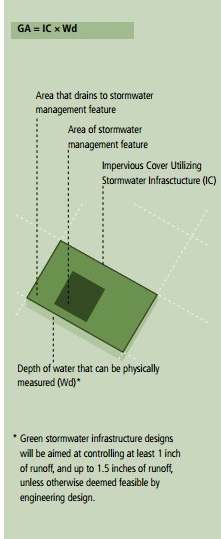
Wallace Roberts & Todd
Philadelphia's Green City, Clean Waters program addresses stormwater in many ways, including on private property.
 By MPC Research Assistant Caroline Rendon
By MPC Research Assistant Caroline Rendon - August 6, 2014
Yes In My Back Yard is an ongoing series of case studies on stormwater management incentive programs around the U.S. and Canada.
Names of programs: Stormwater Management Incentives Program and Rain Check
Location: Philadelphia, Pa.
Organization in charge: Philadelphia Water Department (PWD)
Funding source: stormwater utility fee
Date started: 2012
Type of incentive:
Stormwater Management Incentive Program: grants
Rain Check: cost-sharing
Eligible participants:
Stormwater Management Incentive Program: any business owner or multi-family residential property owner
Rain Check: any single-family property owner
Goals of programs: stormwater volume reduction and education
Assessment Metrics: greened acres, pre-and post-surveys
Philadelphia’s stormwater programs are some of the most robust in the country. The city’s Green City, Clean Waters initiative presents a long term plan for managing and improving Philadelphia’s stormwater issues. The Stormwater Management Incentive Program and Rain Check help advance this initiative. Between incentives for private property owners and projects in the public right of way, green infrastructure is increasingly common all over Philly.
The Incentive Program offers grants to cover green infrastructure retrofits on commercial properties. The most successful applications are those which come with matching funds, include infiltration (allows water to soak into the ground) as well as retention (holds water like a pond) components and those with an educational element. Still, the primary goal of this Incentive Program is to reduce stormwater runoff, and the best projects are those that manage the highest volume of stormwater at the lowest cost. Even within these guidelines, the program is flexible enough to allow projects of any size—current projects range from less than one acre to over 50—and many different stormwater tools.

Philadelphia uses "Greened Acres" to calculate removal of impervious surfaces using green infrastructure to manage stormwater.
Philadelphia Water Dept.
The Philadelphia Water Dept. collects lots of information from program participants and is continually making changes to ensure that the program is cost effective. All applicants must calculate the impact of their property improvements in “greened acres:” one greened acre is equal to one inch of stormwater managed from one acre of impervious surface, or approximately 27,000 gallons of potential storage for stormwater on site and out of sewers per storm. This data also helps Philly demonstrate how its programs are effectively reducing stormwater volume and improving water quality, which it is required to report to its regulators, the U.S. Environmental Protection Agency and the Pennsylvania Department of Environmental Protection.
But stormwater runoff reduction isn’t the only goal of Philly’s incentive programs. Rain Check encourages residents to manage stormwater on their properties while educating them about green infrastructure and the city’s stormwater problems. Through partnerships with landscaping contractors, civic associations and nonprofits, Rain Check provides participants with free property assessments and cost-sharing on stormwater tools. The Philadelphia Water Dept. provides free property assessments for potential participants, and then homeowners can choose from four recommended tools—downspout planters, rain gardens, porous pavers and depaving. The costs of these tools are shared between the Water Department and residents. Depending on the type and size of the stormwater tool, the amount the resident pays can vary significantly, starting at $100. Rain Check is first and foremost a way to educate Philly residents about stormwater issues and empower individual changes, and the assessments are an excellent opportunity for this education to happen.
Rain Check is still in its infancy, but interest in the program is expanding dramatically: Between its first and second years, the number of property assessments doubled. The Philadelphia Water Dept. collects data on program participation, stormwater tool adoption and changes in knowledge and behavior, and this information will help inform future Rain Check policies. Already, program administrators are working to streamline the application and assessment processes, diversify outreach strategies and align Rain Check projects with public right-of-way green infrastructure projects.
The Philadelphia Water Dept. is also accommodating increased interest in its stormwater programs by creating opportunities for projects that don’t fit into either Rain Check or the Incentive Program. For example, neighborhood groups can apply for small grants to maintain green infrastructure installations such as bioswales and tree pits in the public right of way. Another program works to aggregate green infrastructure projects in areas that are prone to flooding, causing combined sewer overflows that contaminate local waterways.
Lessons learned:
- Because Philly’s stormwater programs are extensive and flexible, there is an opportunity for everyone to be involved: Homeowners, business owners, neighborhood volunteers and many others can participate in stormwater solutions!
- Well organized administration helps keep the programs running smoothly. Coordination between multiple agencies and partners can be challenging, but with the help of software like Salesforce, used in Rain Check, and staff members dedicated fully to running the program, the Philadelphia Water Dept. staff is able to stay on track.
- Using “greened acres” to measure project impacts helps the Water Dept. collect data from all of its stormwater programs in a consistent way and report this data to regulatory agencies. It also helps them communicate the impacts of green infrastructure on Philly’s stormwater problems.
Want to learn more about other intiatives around the country? Our Yes In My Back Yard series is for you!